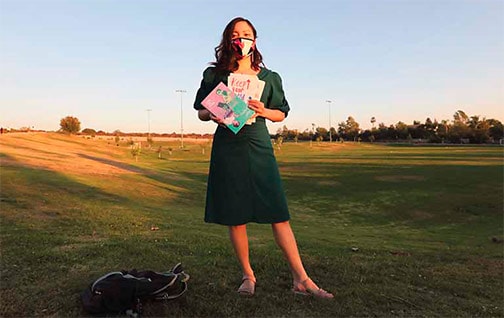Changing young lives one letter at a time

by Steven Felschundneff | steven@claremont-courier.com
During her TEDxTeen talk in November of 2017, Claremont resident Diana Chao said “One human connection can and will save a life,” perfectly describing the inspiration, and chief function of her non-profit, Letters to Strangers.
Letters to Strangers facilitates empathetic communication between youth ages 13 to 24 who are struggling with mental illness—or just struggling in general. The organization’s goals include destigmatizing mental illness while advocating for affordable and expanded mental healthcare.
“Fifty percent of all lifetime cases of mental illness begin by age 14, so it’s very important to us to catch it early on,” Ms. Chao said.
The young people form “chapters” in which they create and exchange handwritten letters describing their personal experiences. Each letter addressed to “Dear stranger” carries the goal of helping the reader realize they are not alone, and may be dealing with the same struggles as another person. Of course, the act of writing the letter provides a positive outlet to its creator as well.
Ms. Chao’s journey includes some dark passages and involves more than one suicide attempt, which is why she describes Letters to Strangers as a personal rebirth.
The organization has guiding questions and themes that can be used as a base for the letter writers. There is also a peer review process, and all letters are screened by a chapter head to ensure any trigger warnings are disclosed. The letters, from which Ms. Chao reads samples during her public appearances, can be haunting and hilarious, introspective and worldly.
“Here at Letters to Strangers, we believe that writing is humanity distilled into ink. And we’ve seen personally how one letter—one human connection—can truly save a life,” Ms. Chao, 22, wrote on the organization’s website.
The seed for what would become Letters to Strangers began in 2013 when Ms. Chao was a sophomore at Claremont High School. She had been diagnosed with bipolar disorder and uveitis, a rare condition that affects one’s vision, and discovered that writing helped with her feelings of isolation and anxiety over the stigma of mental illness.
“Coming from a first generation immigrant family, the stigma was something that I carried very personally, so I wrote a lot of my thoughts out, and one of the things I did was write letters to strangers.” Ms. Chao said. “I decided to turn to my friends and asked them if they would be willing to join me in a club for this at the high school.”
It was very local at first—Ms. Chao quips that she had to bribe her friends with pizza to coax them into giving up their lunch breaks for club meetings. But word spread and about a year later the first satellite chapter opened at Upland High School.
“Up until I graduated I was very quiet about my diagnosis, only a handful of friends knew the reality of my medical life,” she said. “I took a gap year after graduation and went public with my mental health story and that started getting more people interested in the mental health aspect of [Letters to Strangers] and it just kind of went from there.”
Letters to Strangers directly impacts over 35,000 people a year through its chapters and site partners, while thousands more access resources through its website. The chapters are similar to the club she started at CHS, and site partners are places where the letters may be useful in the context of an existing structure, such as youth shelters. The organization has over 50 chapters in 20 countries on six continents.
Last year the organization published the Youth for Youth Mental Health Guidebook, to further the goal of introducing more mental health curricula into schools. The book was written and illustrated entirely by 14- to 21-year-olds from around the world and reviewed by medical and industry professionals.
“It involves input from everyone, from Tunisia to Bhutan, because we dive deep into intersectional identities from religion to race to economic status,” Ms. Chao said. “We also offer it as a free online download so that it is as accessible as possible.”
We Are Family Foundation named Ms. Chao a Global Teen Leader in 2017. She is the youngest winner of the Unilever Young Entrepreneur Award, the 2019 NAMI Young Leader Award and the only American winner of the 2019 Global Changemakers award. She also volunteered for the National Suicide Prevention Hotline and the Lifeline Crisis Chat.
Recently she was selected by L’Oréal Paris’ Women of Worth Awards as a 2020 honoree and received $10,000 for her work with mental illness.
“The program honors the intrinsic worth of everyday women igniting positive change in their communities and championing self-worth in others,” the Women of Worth organization said in a news release.
Ms. Chao is one of ten women to receive the award this year, and the public is invited to support her by voting online at women-of-worth.com. One woman will be selected as this year’s national honoree and will receive an additional $25,000 for her cause. People can vote once daily until balloting closes on November 27, and the national honoree will be announced on December 1.
Recently, the enterprise began a letter exchange program through the website for individuals not affiliated with a chapter. The idea was already in the works, but the launch was accelerated due to the COVID-19 pandemic. Ms. Chao said anyone who submits a letter will receive one in return, but she is also launching the COVID-19 letters collective, which takes the submitted letters and curates and bundles them to send to organizations that serve people who are particularly isolated right now.
Surprisingly, given all of the work she has put into Letters to Strangers, Ms. Chao says she likely will leave her position as executive director in a few years. She is currently a senior at Princeton University, studying geo-sciences with minors in history and diplomacy. She is most interested in the intersection between climate change and its impact on health, in particular among indigenous populations.
“Because I want to keep it a youth for youth thing, at some point I will age myself out,” she said. “Until then we will see what happens. We have a really great staff who are all students and for the next few years, after I graduate, will make this a full time thing.”
In the meantime she continues her fight to remove the stigma of mental illness, including the perception that those who struggle with mental health are somehow less capable than others.
“Mental illness can be battling dragons, only to find their nests in our chests, and we learn to live with fire. So, where is the weakness in that?” Ms. Chao asked during her TEDxTeen talk.











0 Comments